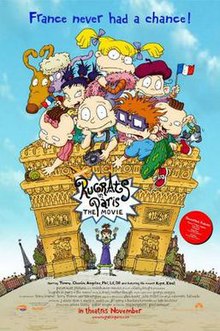
Back راجراتس في باريس: الفيلم Arabic Дребосъчетата в Париж Bulgarian Lumpíci v Paříži Czech Rugrats in Paris – Der Film German Rugrats en París: La película Spanish Ipanat Pariisissa Finnish Les Razmoket à Paris, le film French ראגרטס בפריז: הסרט HE A fecsegő tipegők Párizsban Hungarian I Rugrats a Parigi - Il film Italian
| Rugrats in Paris: The Movie | |
|---|---|
 Theatrical release poster | |
| Directed by |
|
| Written by |
|
| Based on | Rugrats by Arlene Klasky Gábor Csupó Paul Germain |
| Produced by |
|
| Starring | |
| Edited by | John Bryant |
| Music by | Mark Mothersbaugh[1] |
Production companies |
|
| Distributed by | |
Release date |
|
Running time | 78 minutes[3] |
| Countries | |
| Language | English |
| Budget | $30 million[3] |
| Box office | $103.3 million[3] |
Rugrats in Paris: The Movie is a 2000 animated comedy film based on the Nickelodeon animated television series Rugrats. It is the second installment in the Rugrats film series and the sequel to The Rugrats Movie (1998).[4] This film marks the first appearance of Kimi Watanabe and her mother, Kira. The film also marks the appearance of the first significant villains in the Rugrats franchise, the child-hating Coco LaBouche and her accomplice, Jean-Claude. The events of the film take place before the series' seventh season.
The film was released in the United States on November 17, 2000, almost two years after the release of the first film.[3] Rugrats in Paris was more well-received than its predecessor and grossed over $103 million worldwide against a production budget of $30 million. This was the final Rugrats film to feature Christine Cavanaugh as the voice of Chuckie, who retired from being a full-time voice actor in 2001 and died in 2014. A sequel, and a crossover with characters from The Wild Thornberrys franchise titled Rugrats Go Wild, was released on June 13, 2003.
- ^ a b c d e "Rugrats in Paris: The Movie (2000)". AFI Catalog of Feature Films. Retrieved January 17, 2021.
- ^ a b c d e "Rugrats in Paris: The Movie (2000)". AllMovie. Retrieved January 17, 2021.
- ^ a b c d "Rugrats in Paris: The Movie (2000)". Box Office Mojo. IMDb. Retrieved June 17, 2014.
- ^ Rauzi, Robin (November 17, 2000). "Those Little Rugrats Are in Paris? Oui, Wee". Los Angeles Times. Retrieved August 24, 2010.